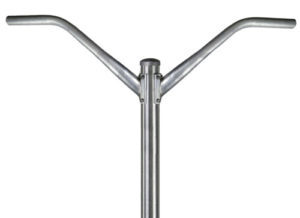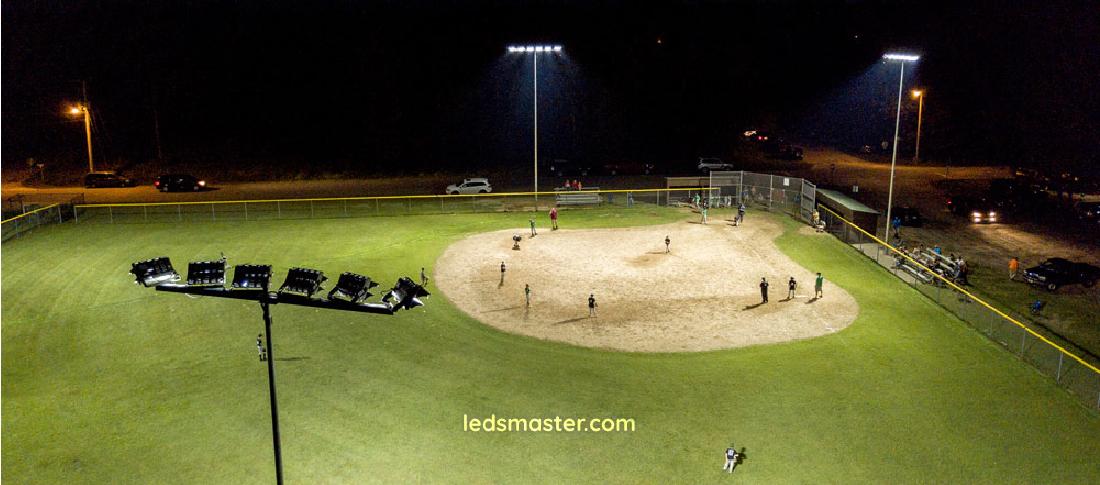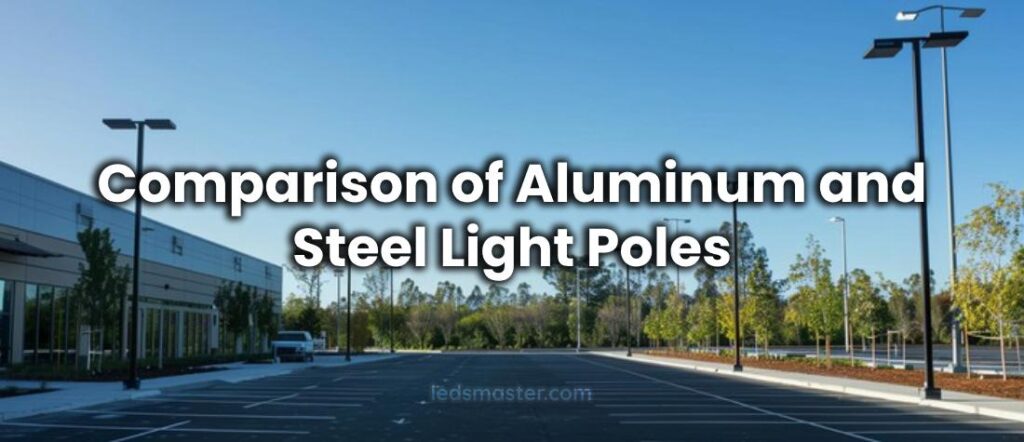When it comes to lighting outdoor spaces, streets, and pathways, choosing the right material for the light pole is crucial. There are many factors to consider, including aesthetic requirements such as color, height, and shape, as well as load restrictions and environmental conditions. Beyond aesthetics, functional and practical needs must also be taken into account when selecting a light pole.
Deciding on the type of pole involves weighing these various factors, and selecting the best material can be challenging. Aluminum and steel are the two most commonly used metals for light poles, each offering unique advantages. This can make it difficult to determine which material is best suited for your specific needs.
In this article, we will explore the different aspects of aluminum and steel light poles and address some frequently asked questions.
Table of Contents
ToggleWhat is an Aluminum Light Pole?

An aluminum light pole is a light pole made from high-quality aluminum, formed into various designs and shapes through molding. These poles can be square, round, regular, or tapered, with different mounting options such as anchor-based or direct burial. Aluminum poles can also feature multiple arms and masts, depending on the lighting project’s requirements. This versatility allows for a wide range of lighting configurations using aluminum poles.
What is a Steel Light Pole?
A steel light pole, typically crafted from stainless steel, functions as a sturdy mounting structure for lighting fixtures. These poles share similarities with their aluminum counterparts in terms of shapes, sizes, and molding techniques, but the key distinction lies in the material utilized. Stainless steel, renowned for its strength and durability, lends robustness to the structure, ensuring reliable support for the lighting apparatus.
Similar to aluminum poles, steel poles come in a variety of configurations, including single-armed or multi-armed designs, providing flexibility to accommodate different lighting requirements. Additionally, steel poles offer diverse burial options, allowing for installation in various environments and terrains. Whether intended for urban streetscapes, parking lots, or outdoor recreational areas, steel light poles provide a versatile solution for illuminating outdoor spaces effectively and securely.
The manufacturing process of steel light poles involves precision engineering and fabrication techniques to ensure structural integrity and longevity. From shaping the steel components to welding and assembly, each step is meticulously executed to meet stringent quality standards and regulatory requirements. As a result, steel light poles deliver resilience against environmental factors such as wind, rain, and fluctuating temperatures, making them suitable for long-term outdoor use in diverse climatic conditions.
In addition to their functional attributes, steel light poles can also be customized to complement architectural aesthetics and urban design schemes. Whether blending seamlessly into modern cityscapes or enhancing the ambiance of historic districts, steel poles offer a versatile canvas for creative lighting solutions. Furthermore, advancements in surface finishes and protective coatings help mitigate corrosion and maintain the poles’ appearance over time, ensuring enduring visual appeal and performance reliability.
Applications of Aluminum Light Poles
Aluminum light poles serve a multitude of purposes across various settings, owing to their versatility and durability. These poles find application in numerous sectors, each benefiting from their distinct features and functionalities.
Urban and Suburban Settings
In urban and suburban areas, aluminum light poles stand tall as beacons of safety and visibility. Along city streets, highways, and freeways, these poles play a vital role in ensuring public safety and security. Whether illuminating bustling intersections or guiding drivers through dimly lit stretches of road, aluminum light poles provide essential illumination, enhancing visibility and reducing the risk of accidents.
Commercial Spaces
In commercial settings such as car dealerships and parking lots, aluminum light poles tower overhead, casting a bright glow over expansive areas. These poles not only serve a practical purpose by enhancing visibility for customers and employees but also contribute to the aesthetic appeal of the space. With their sleek design and uniform illumination, aluminum light poles create a welcoming environment, inviting patrons to explore and engage with the surroundings.
Recreational Facilities
Aluminum light poles find extensive use in recreational facilities, including sports fields, stadiums, and indoor courts. From providing sufficient lighting for nighttime games to ensuring visibility during indoor sports events, these poles are indispensable in facilitating recreational activities. By casting a steady and uniform light across playing surfaces, aluminum light poles enable athletes and spectators alike to enjoy sports and entertainment events safely and comfortably.
Military and Aviation Installations
In military and aviation installations, aluminum light poles serve critical functions, providing essential illumination for security and operational purposes. Whether lighting up air force bases, military zones, or airports, these poles play a pivotal role in ensuring safe and efficient operations in challenging environments. With their robust construction and reliable performance, aluminum light poles withstand harsh weather conditions and provide consistent illumination, enhancing visibility and security in sensitive areas.
Institutional Campuses
Within educational and commercial institution campuses, aluminum light poles are strategically placed to illuminate walkways, parking areas, and open spaces. By providing ample lighting, these poles enhance safety and accessibility for students, faculty, and visitors alike. Whether navigating campus grounds after dark or attending evening events, individuals benefit from the presence of aluminum light poles, which create a well-lit and secure environment conducive to learning, collaboration, and social interaction.
Applications of Steel Light Poles

Steel light poles have similar application areas as aluminum light poles. Here are some common uses.
Streets, Highways, Freeways, and Driveways
Steel poles are frequently employed alongside aluminum poles in road lighting projects. Whether illuminating city streets, guiding drivers along highways, or lighting up driveways, both aluminum and steel poles play crucial roles in ensuring visibility and safety for motorists and pedestrians alike. Their robust construction and reliable performance make them ideal for withstanding the rigors of outdoor environments, providing consistent illumination in all weather conditions.
Parking Lots & Open Spaces
In parking lots and open spaces, a combination of steel and aluminum lighting poles is commonly found. These poles provide ample illumination, enhancing safety and visibility for vehicles and pedestrians navigating through these areas. Whether illuminating large parking lots or expansive open spaces, aluminum and steel poles work in tandem to create well-lit environments conducive to safe and efficient movement.
Indoor Sports Courts, Sports Fields & Stadiums
Both aluminum and steel poles are utilized for lighting in sports facilities, including indoor sports courts, sports fields, and stadiums. These poles ensure sufficient illumination for athletes and spectators, enabling sporting events to be held safely and effectively, regardless of the venue. With their durable construction and high-performance lighting capabilities, aluminum and steel poles contribute to the success of indoor and outdoor sporting activities, providing optimal visibility for participants and audiences alike.
Airports, Air Force & Military Bases
In areas such as airports, air force bases, and military installations, a combination of aluminum and steel light poles is commonly used to meet the diverse lighting requirements of these environments. These poles provide essential illumination for security and operational purposes, ensuring safe and efficient operations in challenging environments. Whether lighting up runways, military zones, or airport terminals, aluminum and steel poles play integral roles in maintaining visibility and safety in critical areas where precision and reliability are paramount.
Compounds and Campuses
Steel poles are often chosen for lighting in the campuses of educational institutions, commercial complexes, and residential compounds. These poles contribute to the safety and accessibility of these areas, providing adequate lighting for students, employees, residents, and visitors alike. With their sturdy construction and long-lasting performance, steel poles offer reliable illumination solutions for illuminating walkways, parking areas, and open spaces within compounds and campuses, ensuring visibility and security for all occupants.
Properties of Aluminum vs. Steel Light Poles
To understand and compare their properties, we will measure them against various parameters that contribute to their usefulness. Though they might appear similar, there are significant differences in their properties.
Strength to Weight Ratio
 Steel light poles are significantly stronger than aluminum light poles. Although aluminum is a lightweight metal, making it easy to transport and install, steel’s superior strength makes it the preferred choice for many applications. However, aluminum light poles are often favored in specific scenarios, such as on highways, because they reduce the severity of car crashes compared to steel poles, which can cause more fatal accidents.
Steel light poles are significantly stronger than aluminum light poles. Although aluminum is a lightweight metal, making it easy to transport and install, steel’s superior strength makes it the preferred choice for many applications. However, aluminum light poles are often favored in specific scenarios, such as on highways, because they reduce the severity of car crashes compared to steel poles, which can cause more fatal accidents.
Stiffness
Steel is much stiffer than aluminum, making it less flexible and harder to deform. This stiffness is a component of steel’s overall strength, making it ideal for heavy-duty light pole installations where durability and rigidity are crucial.
Wind Resistance (Vibration)
Aluminum, being lighter, is more susceptible to shaking and vibrations in strong winds or extreme weather conditions, such as hurricanes. Steel, on the other hand, is highly resistant to wind-induced vibrations due to its strength, ensuring stability in heavy winds. However, the flexibility of aluminum allows it to absorb energy and sway, which can reduce damage during such events.
Corrosion
Steel is composed of iron, nickel, copper, and manganese, with the addition of chromium providing some resistance to corrosion. However, aluminum exhibits superior corrosion resistance compared to steel. Unlike steel, aluminum does not require additional coatings or paint, which can wear off. Therefore, aluminum light poles are highly resistant to corrosion and suitable for all weather conditions.
Price
The cost of light poles is a crucial factor in decision-making. The prices of both aluminum and steel light poles fluctuate based on market rates for raw materials, such as bauxite for aluminum and iron ore for steel. Generally, the production cost of aluminum light poles is higher than that of steel light poles, although aluminum itself might be cheaper to procure than steel.
Maximum Pole Height
Aluminum’s superior malleability allows it to be shaped into poles of considerable height, up to 30 feet or more. Steel, being less malleable, typically results in shorter poles. Despite this limitation, steel poles are still suitable for most major applications due to their strength and durability.
Workability
Aluminum, being a softer metal, is easier to cut and shape, making it more workable than stainless steel. Stainless steel is resistant to abrasion and wear, making it more difficult to manipulate into desired shapes unless melted and molded. This hardness of stainless steel adds to its durability but reduces its ease of fabrication.

Pros and Cons of Aluminum Light Poles
| Pros | Cons |
|---|---|
| Lightweight: Easy to transport and install, reducing shipping costs. | Not So Strong: Susceptible to bending or falling when hit. |
| Corrosion Resistant: Forms a protective oxide layer, making it weather-resistant. | Vibrates a lot: Prone to vibrations in heavy winds. |
| Durable: Long-lasting if not damaged by external forces. | Special Welding Required: Difficult to repair due to specialized welding needs. |
| Highly Malleable: Can be shaped into various sizes and forms. | |
| Better Heights: Can be molded into taller structures than steel poles. | |
| Economical: Cost-effective over the long term despite higher initial costs. |

Pros and Cons of Steel Light Poles
| Pros | Cons |
|---|---|
| High Strength: Suitable for heavy-duty applications. | High Maintenance Costs: Prone to corrosion, requiring frequent upkeep. |
| Durable: Can last for decades, with some structures standing for over 100 years. | Heavy: Difficult and costly to ship, handle, and install. |
| Not Prone to Vibrations: Ideal for regions with heavy winds or hurricanes. | Brittle: Can crack or break under certain conditions. |
| Easy Welding and Repairs: Can be maintained and repaired with conventional techniques. | |
| Resistant to Deformation: Maintains shape under extreme stress and pressure. | |
| Cheaper: Lower initial costs compared to aluminum poles. |
Frequently Asked Questions
1. How can you tell if a light pole is made of aluminum or steel?
When determining whether a light pole is made of aluminum or steel, initial observations might not always provide a clear distinction. However, there are methods available to discern between the two materials. One approach is to examine the shine of the pole’s body; steel typically exhibits a shinier appearance compared to aluminum. If this visual cue is insufficient, a key test can be conducted. By running a key along the surface of the pole, it becomes apparent that aluminum scratches deeply and easily, whereas steel, while still susceptible to scratching, does so with less ease than aluminum.
2. Is aluminum as strong as steel?
Comparing the strength of aluminum and steel involves considering various factors, including their respective manufacturing processes and intended applications. Aluminum boasts a higher strength-to-weight ratio than steel, rendering it relatively strong. However, steel possesses greater stiffness and tensile strength, albeit at the cost of being heavier. Thus, from a broader standpoint, steel is often considered stronger than aluminum. Nonetheless, notable exceptions exist, such as aircraft, which are predominantly crafted from aluminum. Ultimately, the strength comparison between aluminum and steel hinges on factors like manufacturing techniques and specific usage requirements.
3. How much does it cost to install a light pole?
The installation cost of a light pole can vary significantly, contingent upon several factors. Initially, the choice of base preference or burial type must be determined, influencing subsequent installation procedures. This typically involves laying a concrete foundation, the specifics of which are determined by the contracted party. Additionally, the cost of the light pole itself, ranging from $2000 to $2500, must be factored in alongside installation expenses. As a result, the average total cost of installing a light pole typically amounts to approximately $3000, subject to fluctuations of around $500 due to various contracting and ancillary expenses.
4. How long do aluminum and steel light poles last?
In terms of longevity, the lifespan of aluminum and steel light poles diverges significantly, influenced by their maintenance requirements and inherent properties. Aluminum poles are characterized by low maintenance needs, often requiring minimal upkeep efforts. Repair, if necessary, can typically be conducted without extensive difficulty. Conversely, steel poles demand higher levels of maintenance to mitigate corrosion risks and ensure prolonged functionality. Regarding lifespan, aluminum poles exhibit remarkable durability, withstanding up to 100 years with minimal to rare maintenance interventions, exceeding typical lifespans. Conversely, steel poles boast substantial longevity, enduring between 60 to 80 years, provided they receive adequate care and maintenance.
Conclusion
Both aluminum and steel light poles have their advantages and disadvantages. The best choice depends on your specific project needs, budget, and maintenance capabilities. Aluminum offers lightweight, corrosion-resistant, and highly malleable options, making it ideal for many applications. Steel provides unmatched strength, durability, and stability in heavy-duty environments. Use this guide to help you decide which material is best for your outdoor lighting projects.

